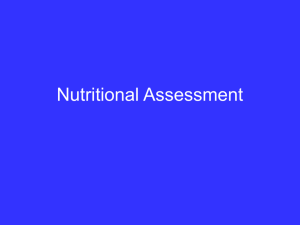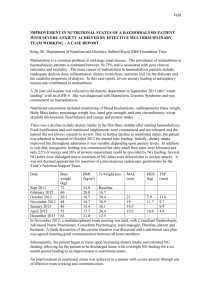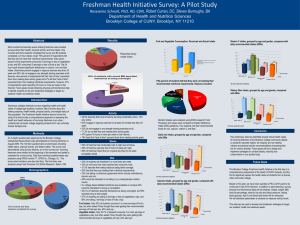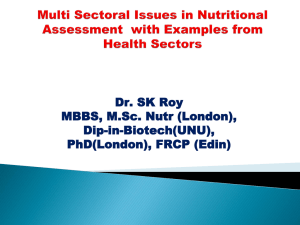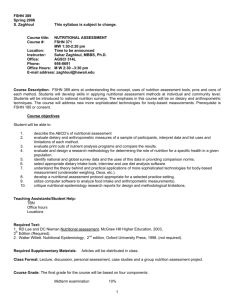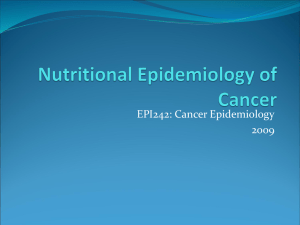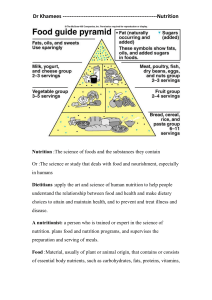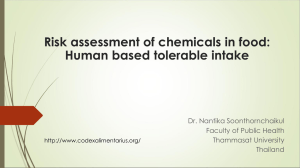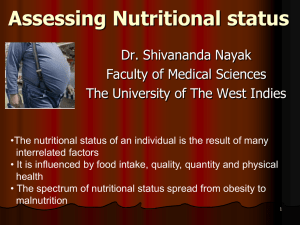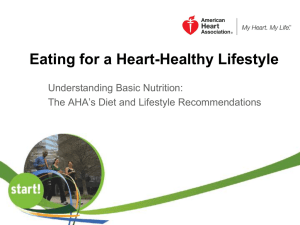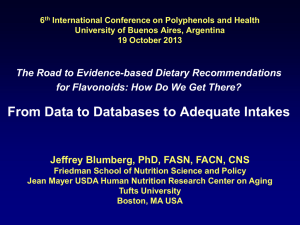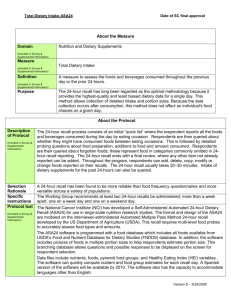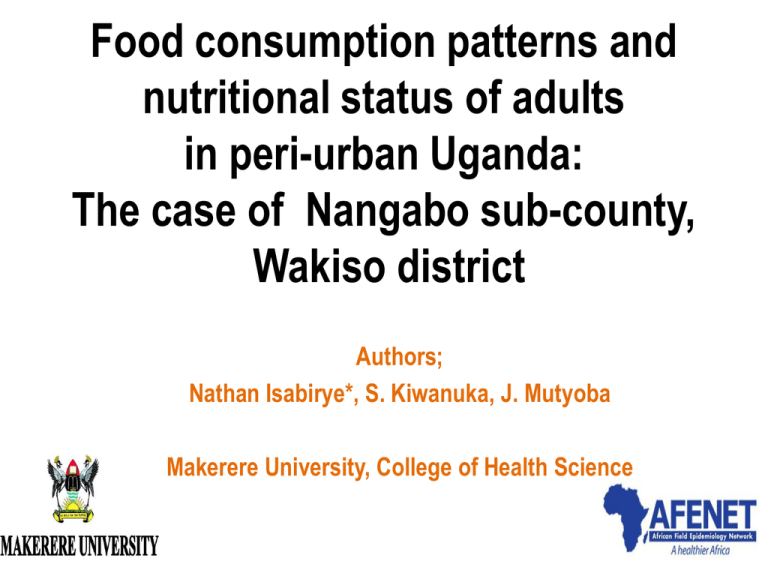
Food consumption patterns and
nutritional status of adults
in peri-urban Uganda:
The case of Nangabo sub-county,
Wakiso district
Authors;
Nathan Isabirye*, S. Kiwanuka, J. Mutyoba
Makerere University, College of Health Science
Presentation outline
•
•
•
•
•
•
•
•
•
•
Introduction and background
Study aims and objectives
Location of study site
Methodology
Data analysis
Study findings
Study limitations
Conclusion
Recommendations
Acknowledgement
Introduction and background
• Globally, NCDs contributes 61% of all deaths; 80% in LICs
• Unhealthy diet a major determinant of NCDs (WHO, 2002)
• Mainly due to dietary transitions and globalization
• Recent survey in Uganda (UNDS,2011) indicated 19.2%
prevalence of obesity and overweight among HHs
• Limited information available on dietary practices of the
population
• Enriching available information, guide nutrition interventions
Study aims and objectives
General objective
• To establish adults’ nutritional status, dietary intake and patterns
among adults in Nangabo S/C, Wakiso district.
Specific objectives
This study assessed;
1. Nutritional status of adults in Nangabo S/C, Wakiso district
2. Average Daily Macronutrient Food intake (ADMFI)
3. Consumption patterns among adults in Nangabo S/C, Wakiso
district
Location of study site
Wakiso district
as Peri-urban,
borders
Kampala city
Methodology
Study design: Cross sectional study
Sample size: 316 respondents
Sampling technique:
• Respondents from an existing cohort by Mak-SPH
• 300 respondents were enrolled in the study
Tools used:
• Food Frequency Questionnaire
• Standardized tools for physical measurements
• Weighing Scale & Measuring tapes
Data analysis
• Software utilized; EPI-data ver 3.1 and STATA version 10
• Food intake frequencies categorized to obtain patterns
• ADMFI =∑nutrients in specified serving × frequency of intake/30
• Nutrient intakes compared using RDAs (King et al, 1993)
• Logistic regression analysis utilized to assess associations
Study findings
Table 1: Nutritional status of respondents as measured by BMI
Nutritional
status(Kg/M2)
Prevalence (%)
Overall
≤24.99
25.00-29.99
≥30.00
N
186
72
42
(%)
62.0
24.0
14.0
Sexspecific
Agespecific
Male
N
%
≤24.99
25.00-29.99
≥30.00
117
20
5
82.5 69
14.0 52
3.5 37
Total
142
100
18≤39
n
%
40-79
n
%
43.7
32.9
23.4
127
45
15
68.0
24.0
8.0
49
23
25
51.0
23.5
25.5
100.0
187§
100
97§
100
Female
N
%
158
Table 2: Nutritional status in comparison with demographic factors
Demographic factor
Sex
Male
Female
Age
18-39
40-79
HH size
1-3
4-7
<8
Respondents status
HH head
Spouse of HH head
Other
Main work status
Employed
Self employed
Not employed
Education level
Primary
Secondary
Tertiary
BMI≥30.00
(n)
BMI≤29.99
(n)
Un adjusted
OR
25
89
117
69
1.0
6.0
60
48
127
49
1.0
2.1
26
58
30
69
93
23
1.0
1.6
3.4
34
70
9
100
37
48
1.0
5.6
0.55
16
59
34
28
82
54
1.0
1.3
1.1
46
45
18
70
68
37
1.0
1.0
0.7
95%CI
Adjusted
OR
1.0
95%CI
3.5-10.2
4.6
1.8-11.3***
1.3-3.4
1.0
2.2
1.1-4.6*
0.9-2.8
1.7-7.0
1.0
1.0
2.3
0.5-2.3
1.0-8.0
3.2-9.7
0.2-1.2
1.0
2.6
0.4
0.9-6.7
0.1-1.2
0.6-2.5
0.5-2.3
1.0
0.9
0.6
0.3-2.3
0.2-1.5
0.5-1.7
0.4-1.5
1.0
0.8
0.3
0.3-1.8
0.0-1.6
Table 3: Respondents ADMFI over a one month period dietary recall
Parameter
Sex specific Macronutrients intake
Male (n=142)
Carbohydrates Proteins Fat(g)
(Kcal)
(g)
Female (n=158)
Carbohydrates Proteins Fat(g)
(Kcal)
(g)
Total sum of
nutrient
intake
17,471,630
507,989
348,797 15,836,124
415,632
354,807
ADMFI
4,101.32
119.24
81.87
3,340.95
87.69
74.8
RDA
2,944
57
57
2140
48
48
Extra intake
1157
45
24
1200
40
27
0.7
0.4
0.6
0.8
0.6
Proportion of 0.3
Extra intake
(extra
intake/RDA)
Table 4: Food consumption patterns of respondents over a month period
Food category
Daily(1-6+ times
per day
Grains, potatoes & Posho, Plantains
related foods
Fruits
Consumption pattern
1-5 times per week 1-3 times per
month
Pillau, Irish potato,
sweet potato,
cassava
Beans alone/soup,
tomatoes, cooked
onions
Orange, apples,
water melon
Legumes,
vegetable & nuts
g.nut stew, beans
mixed,
Meats, fish, & eggs
Beef, Dried fish,
eggs
Mutton, offal,
chicken,
Dairy foods
Tea without milk
Powdered milk,
yoghurt
Beverages
Soda
Beer, Wine,
alcoholic beverages
Other foods
Margarine, animal
fat
seasonally
Mangoes, papaya,
jackfruit
Study limitation
Recall for 1 month difficult
• Minimized by listing all foods
Results represent peri-urban, not generalizable
Conclusion
Overall prevalence of overweight and obesity was 24.0% and
14.0% respectively
• More prevalent in women (32.9%, 23.4%) and in older age
group
Females had a higher extra intake than males for all macronutrients (0.6vs0.3, 0.8vs0.7, 0.6vs0.4)
Staples and legumes were foods consumed daily.
• Considerable consumption of fats and oils were observed.
• Seasonally consumed foods were fruits and vegetables.
Recommendations
Create awareness of the increasing rate of obesity
• Need to better understand obesity and related illness
• Initiate interventions based on our local settings
Need for promotion of health habits and dietary practices
• Promote physical activity especially among females
Government should engage in food security support
• Food preservation
• Backyard gardening – targeting peri-urban settings
Acknowledgement
MaK-SPH
NCD-Working group
Suzanne Kiwanuka
David Guwatudde
Joan Mutyoba
(FETP)
Field Epidemiology
Training program
Thank you!

